Encountering Andrew Huang (黃學正) is like meeting a kung-fu master. Only this master’s uncontested prowess is of a gastronomic kind, manifested through his creative compositions that are the exuberant synthesis of distinctive flavors and aromas. And instead of setting up a school to procure fame and disciples, the martial artist chooses to live among us, in an unostentatious residential neighborhood near Taipei’s Xingtian Temple (行天宮).
Huang’s Dolce & Crepes is literally in his home, with his two elementary school-aged daughters often seen doing homework on a round table in the living room that doubles as the dining area, where patrons eagerly await the feast they ordered from the menu scribbled on the wall.
It is under this domestic veneer that Huang works his magic. Using nothing more than the usual pots and pans, he produces dishes of a culinary refinement on a par with that of Taipei’s top fine dining establishments.
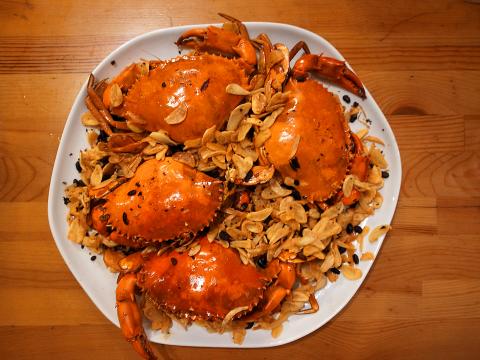
Photo: Ho Yi, Taipei Times
Patrons are given full attention upon entering the simply decorated room. Huang takes the time to give a detailed explanation of how the food is prepared and cooked and to suggest wine and drinks to accompany the meal. The owner and chef seems to have a natural ability to describe the nuance of flavors and his luscious combinations of ingredients in a very vivid way, luring diners into an epicurean fantasy that preludes the banquet to come.
Huang’s menu contains only around a dozen dishes, but each is hard to resist. The chocolate duck leg confit (油封鴨腿, NT$380), for example, consists of lean meat cooked to tender perfection and seasoned in an appetizing vinegar-based sauce, while the aroma of cocoa delivers an exciting punch to the meat. Huang says the duck leg is marinated and roasted in extra-virgin olive oil instead of duck or goose oil so as to give the French specialty a fruity and less cloying flavor.
The lamb shoulder stewed with figs and apricots (無花果杏桃燉羊肩, NT$680) is another delicate composition which sees the divine match of fresh figs and succulent lamb exploding in the mouth, smoothened by the sweetness of apricots and sauteed vegetables.
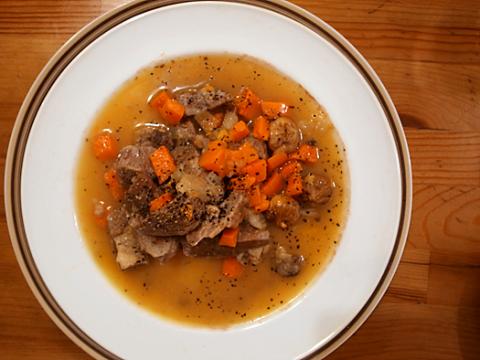
Photo: Ho Yi, Taipei Times
The Chinese culinary influences also have a strong presence on Huang’s menu. The Sichuan-style spicy chicken (川麻口水雞, NT$580) and king oyster mushroom (川麻杏鮑菇, NT$580) use various types of Sichuan pepper to create an enticing, tongue-numbing sensation, and the homemade pepper oil and sauce taste so good that it is almost a crime not to lick the bowl clean.
For seafood lovers, Huang’s popular plate of crabs with deep-fried garlic chips (NT$2,000 or NT$1,000 depending on the types of crab) is definitely a high point of a visit to Dolce & Crepes. Though we weren’t there during crab season, the crustaceans Huang picked for my dining companions and me last month were satisfactorily plump and sweet, buried under the savory layers of garlic chips and doushi (豆鼓), or fermented black soybean, that are fried using olive oil till they are crispy.
Vegetarians are also in for a surprise. Fun to look at and pleasant to taste, the roasted balloon with mushroom juice (菌汁烤氣球, NT$220) is a specially sauced bean curd that puffs up when roasted and contracts after cooling down. The end result is a large piece of bean curd that is firm on the outside but retains a fine, soft texture on the inside.
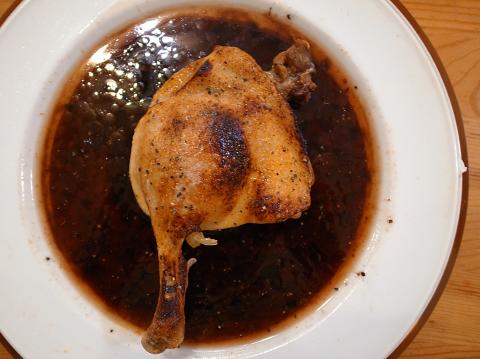
Photo: Ho Yi, Taipei Times
Affable and well-informed, Huang appears to be a versatile master with hidden talents and skills. Those interested in renewable energy may want to raise related topics with their host. Huang is also the chief executive of Advanced Power and Energy Transportation, a company that’s developing a green car running on zinc-oxygen energy fuel cells.
A word of reminder: Please leave smelly socks at home because diners are required to take off their shoes before entering Huang’s home-cum-restaurant.
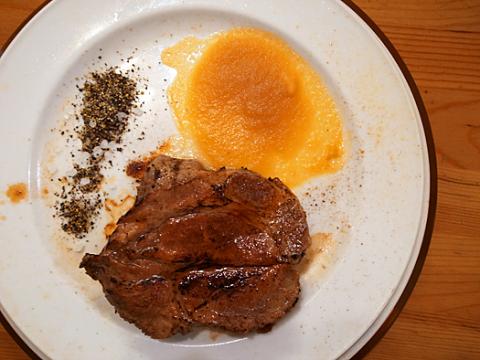
Photo: Ho Yi, Taipei Times
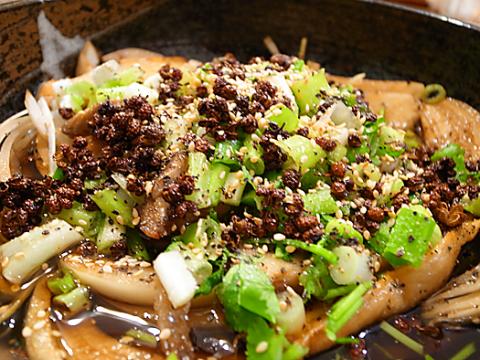
Photo: Ho Yi, Taipei Times

April 14 to April 20 In March 1947, Sising Katadrepan urged the government to drop the “high mountain people” (高山族) designation for Indigenous Taiwanese and refer to them as “Taiwan people” (台灣族). He considered the term derogatory, arguing that it made them sound like animals. The Taiwan Provincial Government agreed to stop using the term, stating that Indigenous Taiwanese suffered all sorts of discrimination and oppression under the Japanese and were forced to live in the mountains as outsiders to society. Now, under the new regime, they would be seen as equals, thus they should be henceforth

Last week, the the National Immigration Agency (NIA) told the legislature that more than 10,000 naturalized Taiwanese citizens from the People’s Republic of China (PRC) risked having their citizenship revoked if they failed to provide proof that they had renounced their Chinese household registration within the next three months. Renunciation is required under the Act Governing Relations Between the People of the Taiwan Area and the Mainland Area (臺灣地區與大陸地區人民關係條例), as amended in 2004, though it was only a legal requirement after 2000. Prior to that, it had been only an administrative requirement since the Nationality Act (國籍法) was established in

Three big changes have transformed the landscape of Taiwan’s local patronage factions: Increasing Democratic Progressive Party (DPP) involvement, rising new factions and the Chinese Nationalist Party’s (KMT) significantly weakened control. GREEN FACTIONS It is said that “south of the Zhuoshui River (濁水溪), there is no blue-green divide,” meaning that from Yunlin County south there is no difference between KMT and DPP politicians. This is not always true, but there is more than a grain of truth to it. Traditionally, DPP factions are viewed as national entities, with their primary function to secure plum positions in the party and government. This is not unusual

US President Donald Trump’s bid to take back control of the Panama Canal has put his counterpart Jose Raul Mulino in a difficult position and revived fears in the Central American country that US military bases will return. After Trump vowed to reclaim the interoceanic waterway from Chinese influence, US Defense Secretary Pete Hegseth signed an agreement with the Mulino administration last week for the US to deploy troops in areas adjacent to the canal. For more than two decades, after handing over control of the strategically vital waterway to Panama in 1999 and dismantling the bases that protected it, Washington has